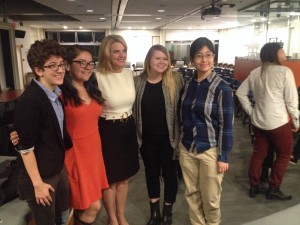
Despite the legislative success of gay marriage this year, the LGBT community is still far from reaching universal acceptance in the United States, GLAAD Chief Executive Officer Sarah Kate Ellis said in a lecture at Princeton University this week.
Fighting workplace discrimination and providing access to suitable restrooms for the trans community are two of GLAAD’s current priorities, Ellis said.
“The Freedom for all movement is looking at all the civil rights we still don’t have as a community,” Ellis said. She added that acceptance is a human right that should not require LGBT community members to change or assimilate.
Almost 50 percent of Americans are very uncomfortable with LGBT people and 20 percent of self-described LGBT allies would not attend a gay wedding, a recent GLAAD poll revealed. Although prized athlete and reality television star Caitlyn Jenner came out to the world in Vanity Fair, 20 trans women were murdered this year, Ellis added.
“There is a stark different between changing the law and changing the hearts and minds of Americans,” Ellis said. “We still live in a country where we cannot fully share our lives or our loves.”
GLAAD aims to build acceptance by telling individual LGBT stories, launching media campaigns and by working very closely with media outlets surrounding events like Caitlyn Jenner’s coming out, Ellis said. Thanks to social media, the organization can also rely on members of the LGBT community to directly voice their opinions.
As a result of this trend in social media, the organization now has more resources to take a proactive approach to high-profile visits like Pope Francis’ recent tour of the United States, Ellis said. GLAAD pointed out that even though 76 percent of Roman Catholics accept LGBT people, a minority of anti-LGBT leaders still dictates the church’s stance on homosexuality.
GLAAD also focuses on the representation of LGBT people in television shows and films. Writers like Shonda Rhimes and Lee Daniels present LGBT characters who have depth, complexity and strength, Ellis said.
“Shows are becoming more reflective of who we are,” she noted. However, Hollywood blockbuster films still present LGBT characters as the butt of the joke or as punching bags, Ellis said.
GLAAD’s next study will analyze possible complacency in the LGBT movement after marriage equality, Ellis said. Although the fight for equal marriage rights mobilized millions of LGBT people and allies, it also has the potential to disperse supporters, Ellis said.
“We’ve got to keep the momentum going,” Ellis said. “This is not the time to rest. This is the time to act.”











